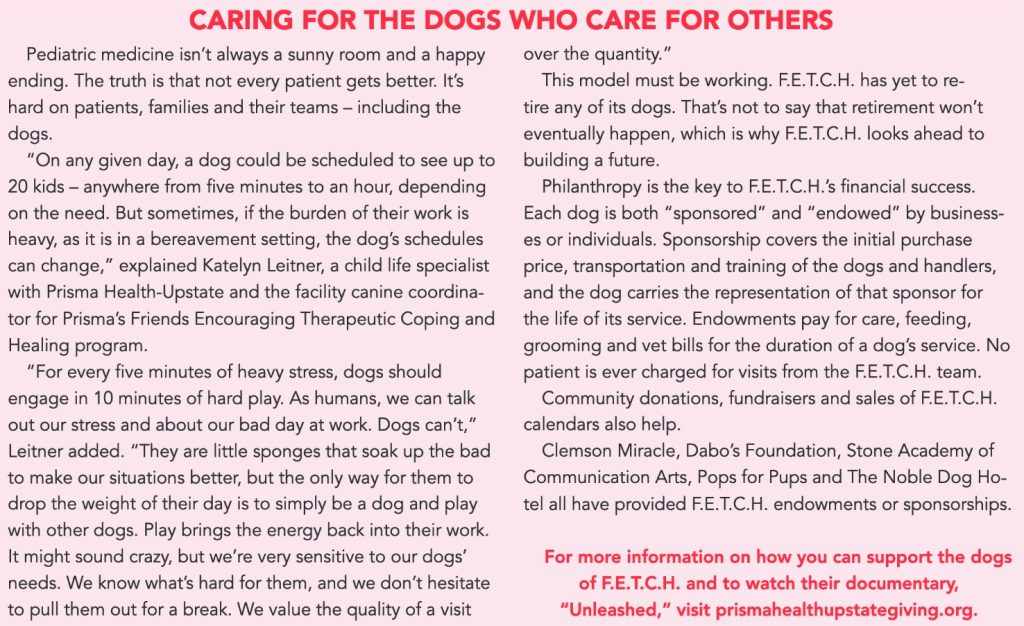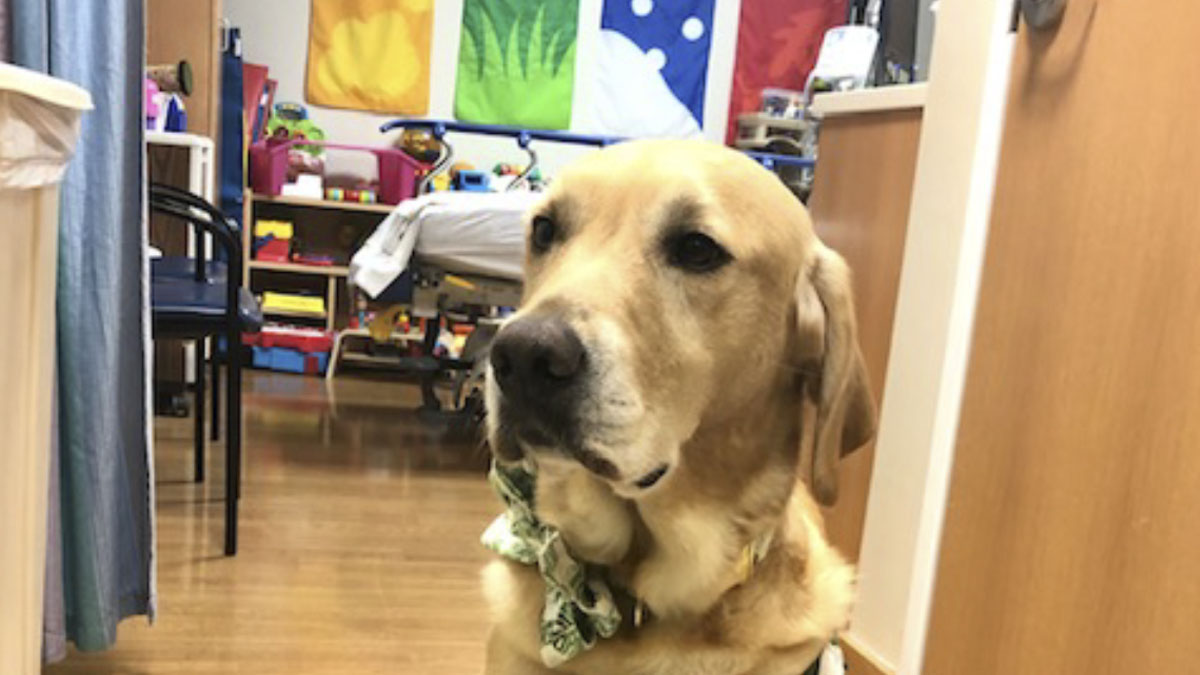“How do you feel about dogs?” Katelyn Leitner, child life specialist, asks a nervous patient at Prisma Health-Upstate.
When the little girl says she loves dogs, Leitner nudges the conversation a bit further.
“What if I had a dog that worked here and could come help us with what we’re doing today? If I did, would you want to meet her?”
A nod. Leitner leaves the room and returns with Kalle, a golden retriever/Lab mix.
Then comes Leitner’s favorite moment in the introduction: the patient’s reaction.
“It’s the same face every time,” Leitner laughed. “When the dog is brought into the room, the patients always make the face. It’s joyful and surprised and it’s the purest, most genuine thing I see in the course of a day.”
In addition to her duties as a child life specialist with Prisma Health-Upstate, Leitner is the facility canine coordinator for Friends Encouraging Therapeutic Coping and Healing – F.E.T.C.H. – a 6-year-old program that is the first of its kind in South Carolina.
Eight dogs share the duties of the F.E.T.C.H. program. Five of them focus on pediatrics, while two dogs help with adults and one “floating” pup goes wherever it is needed.
Kalle, King, Cookie, Becky and Vivi make up the four-legged pediatric FETCH team.
“This program was started with lots of passion behind it,” Leitner said. “We had visiting volunteer therapy dogs, and, every time they visited, things were better for the kids. We thought, ‘Why can’t better be always?’ We decided to work to make it be always.”
“We still have our volunteer therapy dogs, and we love our volunteer family,” Leitner added. “But the facility dog model allows us to go beyond some of the limitations associated with volunteer pups.”
Each dog has a primary handler and is identified as the dog’s “mom or dad,” plus a secondary handler – “the fun aunt”; there currently are no fun uncles – who also trains with them and serves as backup. F.E.T.C.H.’s handlers are child life specialists, physicians and a psychologist.
Though they might be fluffy, the dogs’ presence isn’t “just fluff.” They work hard for their money, errr . . . treats . . . and they have measurable effects. From consolation to education to finance, these dogs illustrate their value daily.
Vivi, a doodle specializing in pediatric sedation and radiology, is a good example of how these dogs can help save the hospital, patients and insurance companies money.
One of Vivi’s patients requires MRIs on a regular basis. Prior to the dog’s involvement, the child’s stress level required sedation to keep her calm and still for every MRI. Sedation involves IVs, fasting and perhaps an overnight stay. These daunting experiences and expenses are moot when Vivi jumps onto the table, lies on her patient’s feet and “takes the ride” through the MRI machine with her friend. When Vivi is present, the patient is comforted and remains still without the need for medical intervention. The patient can come in, have her “pictures” taken and leave without extraneous measures or costly stays.
Another 7-year-old patient previously had a negative experience with the insertion of an IV at a facility through a different health care system. It was a taxing event, resulting in the youngster being physically restrained. Both he and his mother were nervous about the IV requirement for his procedure at Prisma. After finding out that the patient had dogs at home, Leitner recruited Kalle for assistance.
The patient and mother – making “the face” – were delighted. The patient loved Kalle, and the IV was administered with one nurse, Kalle, and Leitner present. One poke. No tears. No restraints. One mother sobbing in relief.
“This is how it should be,” the mother said, “and that’s not how his first experience was. Now that I know that it [an IV] can be done, it’s a game changer.”
F.E.T.C.H. dogs also can do what dogs do best: listen.This was never more apparent than when a young patient was admitted to the hospital because she had attempted to harm herself. Leitner, Kalle and the patient went on a long walk ending in Prisma’s vast playroom, which has lots of soothing, natural light. The trio sat on the floor, with Kalle sandwiched in between.
“Can I tell you why I’m here?” the patient asked.
Petting Kalle, she matter-of-factly recited her troubles. Her father recently died from cancer, she’d broken up with a boyfriend, she was having these feelings and didn’t know what to do with them, that she attempted her overdose and most upsettingly to her, her little brothers found her unconscious.
“I don’t want that to happen again,” she said.
“This is a delicate area for a child life specialist,” Leitner said. “We aren’t necessarily psychiatrists or therapists, so we focus on making the patient comfortable – letting them know that they are OK here.”
But something about the young woman’s factual delivery tugged at Leitner.
“Do you have big feelings?” Leitner asked. “You don’t have to tell me, but Kalle is a great listener.”
The patient lifted Kalle’s soft, golden ear and whispered her secrets. After some time, she spoke out loud, muffled only by Kalle’s fur.
“That was scary,” she said. “But I feel so much better.”
“Dogs are so magical and can be a huge bridge for children who are scared, confused or have big feelings,” Leitner noted. “They are exceptionally talented when it comes to helping children in the Psychiatry Department and children on the spectrum. It’s a world our dogs can access that we as adults sometimes can’t,” said Leitner.
The F.E.T.C.H. dogs have a larger-than-life presence in the Upstate community. They’re seen throughout Prisma-Upstate hospital systems and offices and make a big splash with their Instagram accounts and their appearances at local events.
“We go out and visit elementary schools for health and career fairs, and there is a huge Instagram following,” Leitner said. “We also attend donor-funded events and have developed excellent relationships with dog-related businesses in the Upstate.”
One member of the team is the star of two books: “Kalle Gets an EEG” and “Kalle Goes to the Doctor.” Rich photography accompanies Kalle’s tales, which eases fear caused by potentially frightening medical procedures.
The dogs are also featured in their own 25-minute documentary, “Unleashed.”
By Amy Gesell

